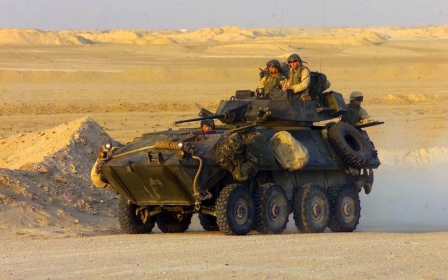Canada's conservatives criticise Trudeau's Syria plan

Canadian Prime Minister Justin Trudeau defended on Wednesday the planned withdrawal of military jets from the fight against the Islamic State (IS) group, after Canadians died in recent attacks by the militant organisation.
Facing a growing backlash at home for ordering the withdrawal of the six CF-18 fighter jets from the US-led coalition fighting in Iraq and Syria, Trudeau insisted Canada still plans to contribute militarily to the fight, in some other capacity.
Ottawa has yet to say exactly how, but Trudeau suggested Canada could send more military trainers to Iraq to "help local troops bring the battle directly to (the enemy)".
Trudeau made his comments at the World Economic Forum (WEF) in Davos, where he pitched Canada's economic strengths to leaders.
In addition to the CF-18 fighter jets and other military aircraft, Canada deployed some 70 special forces to northern Iraq to train Kurdish forces in 2014.
"Canada recognizes that we need a global concerted response to... terrorists," Trudeau said.
"Canada has an important role to play, on a humanitarian side, on a refugee side, and yes on the military side as well."
But, he added, "If there is one thing that recent history has taught us is that ultimately, conflicts like this need to have their resolution on the ground, with people who live (there) and want to take their countries back from terrorists."
Canada’s defence minister, Harjit Sajjan, told reporters that he will not attend the World Economic Forum, stressing instead that he plans to meet with NATO members in Brussels next month.
A US State Department official told the Guardian on Tuesday that the talks in Brussels are not a formal coalition strategy session, but rather a more informal meeting of defence ministers.
When the Guardian inquired about Canada’s exclusion at the meeting in Davos, the official replied: “The United States and Canada are great friends and allies, and together with coalition partners, we will continue to work to degrade and destroy ISIL,” using another acronym for IS.
Conservatives call Trudeau's policy 'incoherent'
Earlier in the week, a grieving mother led strong condemnations of Canada's plans to pull back militarily against IS fighters after seven Canadians were killed in overseas attacks.
Camille Carrier, whose daughter Maude was one of six Canadian victims of an attack in Burkina Faso on Friday, said she was "ashamed" by Ottawa's stance, while a Tory opposition MP called the Liberal government's policy on fighting IS "incoherent".
A Canadian was also killed in Jakarta last week in an attack by a group allied with Islamic State militants.
Carrier, whose daughter died when Al-Qaeda in the Islamic Maghreb (AQIM) attacked the Splendid Hotel in Ouagadougou, said that Canada should be boosting its military response and standing with allies such as France and the US, not retreating.
Trudeau "offers shallow words about inclusion and tolerance. We need to do more. We need our leader to pay attention to legitimate security concerns in addition to our image as a welcoming country," she said.
Carrier alluded to Canada's welcoming with fanfare of 10,000 Syrian refugees since November and plans to bring in another 15,000 by February.
Opposition MP James Bezan, meanwhile, branded the government's policy on fighting the IS group as "incoherent."
"The decision to withdraw Canada's CF-18s is seen by our allies as stepping back, rather than standing shoulder-to-shoulder with them," he said.
Several Canadian cities no longer accept refugees
Meanwhile, the government said on Wednesday that several major Canadian cities will temporarily stop taking Syrian refugees.
Refugee agencies in Halifax, Ottawa, Vancouver and Toronto asked for a pause in resettlements, citing a lack of affordable housing and a shortage of staff.
Immigration Minister John McCallum told reporters in Toronto that he would oblige and have new arrivals diverted to other cities until those feeling overwhelmed sort out their issues.
McCallum acknowledged that "housing is a challenge, but I think we are in the process of meeting that challenge," he said.
"The flow from the airplanes is not slowing down at all," he said. "But if certain towns or cities need a pause, there will be other places in Canada that will receive the refugees.
"There are many, many places in Canada that are crying out for refugees."
As of 19 January, Canada has welcomed 11,866 Syrian refugees and another 5,829 have been cleared to travel here.
Ottawa has pledged to take in a total 25,000 by the end of February.
Stay informed with MEE's newsletters
Sign up to get the latest alerts, insights and analysis, starting with Turkey Unpacked
Middle East Eye delivers independent and unrivalled coverage and analysis of the Middle East, North Africa and beyond. To learn more about republishing this content and the associated fees, please fill out this form. More about MEE can be found here.




